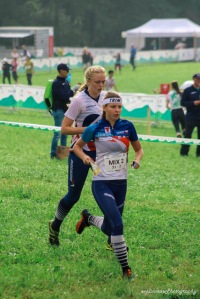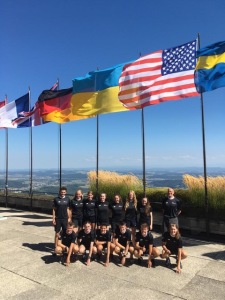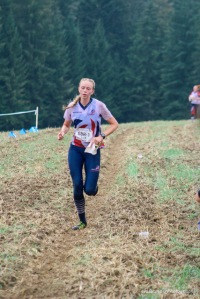Having spent most of the previous year living in Switzerland, I was really looking forward to racing at the World University Orienteering Championships in the Swiss Jura. Not the typical alpine terrain that first comes to mind when picturing Switzerland, but a challenge nonetheless.
I had been selected to run three out of five races at this week-long competition, all of which were in the forest, as opposed to the sprint discipline which is usually in an urban setting. This meant I could really focus on my forest orienteering technique leading up to the competition. My preparation was slightly hampered by catching COVID a few weeks before the competition and missing some of my key training races in the build-up. Luckily, I had planned to travel out to Switzerland a few days before the competition to train on relevant areas, test different techniques and come up with a race strategy.
Having cheered on my teammates running in the individual sprint race the previous day, I was ready to step up to the start line of the long distance race. The terrain consisted mainly of coniferous forest with varying degrees of brambles and brashings underfoot, big forestry tracks and some steep gullies that made for interesting route choice. Despite this area feeling fairly familiar to some areas in the south of England, a momentary lapse in concentration meant I messed up my direction out of a control and proceeded to make a costly parallel error which involved losing a lot of height. Frustrated, I tried to hold it together for the remaining half of the race but always had a nagging feeling of needing to make up time. As many orienteers will appreciate this often forces more mistakes, and for me a very scrappy second half with many smaller time losses. Overall, I was unsatisfied with my performance but tried to use the frustration to fuel my preparation for the middle distance race, my preferred discipline.
The area of the middle distance was much more suited to my strengths. It consisted of a steep slope with lots of limestone rock and contour detail, and lots of controls meaning there were no opportunities to switch off. After a slightly hesitant start into a tricky area of forest with low visibility, I settled into the map and began to find my flow. Following two long uphill legs across an open field I knew a top French runner was closing me down. Keeping a cool head, I managed to stick to my plans and pick off the next set off technical downhill controls, whilst the faster French runner weaved in and out making multiple mistakes. Having got a gap, I reached the arena passage having caught two other competitors, now on my tail. The arena run through was a very steep bank which left me in a fair amount of oxygen debt going into the final loop. I tried to focus on my direction crossing the steep slope however being a few degrees off meant I was much higher than my control and had to drop down. This mistake proved significant and meant I just missed out on at top 20, finishing in 23rd. Despite being initially annoyed at how close I was to a clean run, there were many positives to take into the relay.
The relay marked the final day of racing, and after a flying start by our first leg runner I was set out in the front group. After leading the first few controls, the group had spread out and split on a routechoice leg. In trying to balance sticking to my own routechoices and keeping the front runners in sight, I began to lose control and take some suboptimal routes. Going through a thick area of forest I found myself running alone and similarly to the long race, a few more scrappy controls meant I had lost some time to the leaders. Luckily our last leg runners managed to claw back some time finishing 7th nation.
The week was a brilliant experience and incredible fun, despite some races not going as I had hoped. I connected with many old friends who I haven’t seen since junior competitions pre-covid and met new people from as far as Japan and Hong-Kong. I’ve come away with a renewed motivation for the winter season, and my move to Sweden this September. I hope to be able to focus more of my time on orienteering training so I can be better prepared and more confident going into important international competitions.
A huge thankyou goes to the Jack Bloor Foundation for their continuing support of my Orienteering endeavours. In such an underfunded sport, athletes are responsible for funding the entirety of these competitions, which adds up across the year. Therefore, the Jack Bloor Foundation’s contributions really do make it possible to continue competing at an elite level, for which I am very grateful.
Laura King


